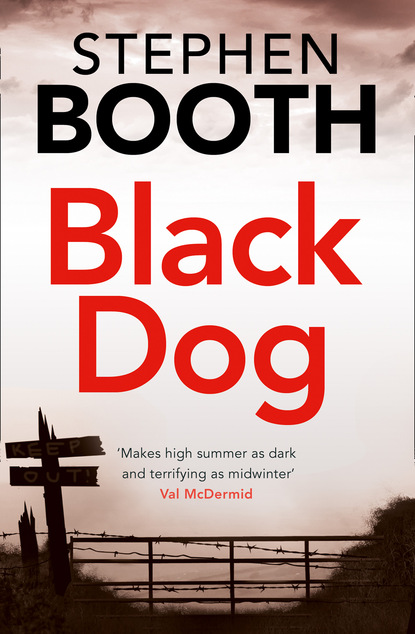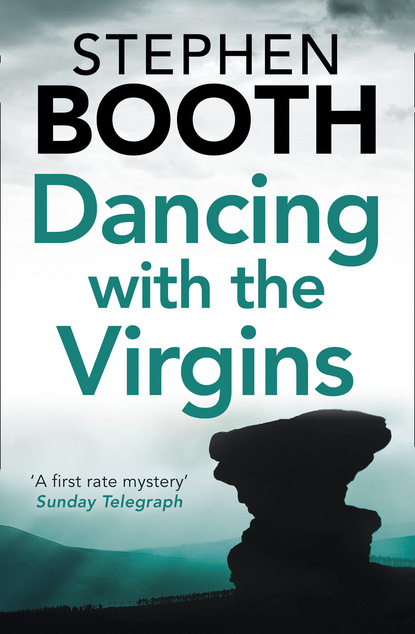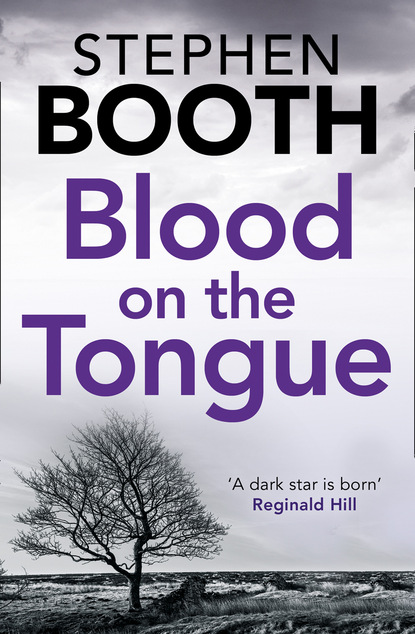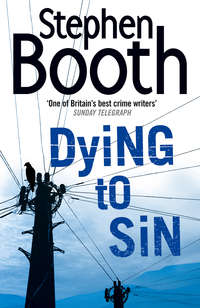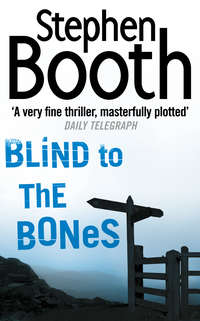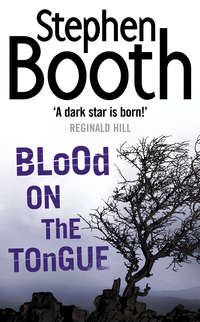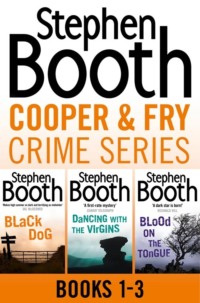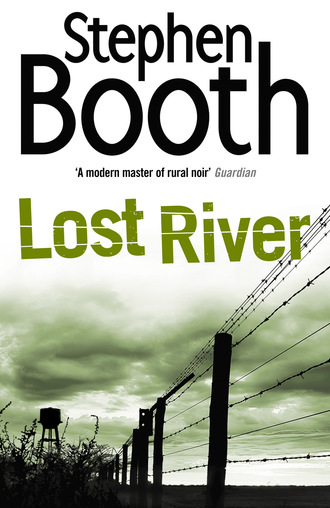
Полная версия
Lost River
Fry sighed. Oh, well. God had sent Ben Cooper to her as a challenge, there was no doubt about that.
‘I need to hand over this case to you. The drugs enquiry on the Devonshire Estate.’
‘To me?’
‘Yes, to you. Acting DS Cooper.’
‘Right. That would be Michael Lowndes?’
‘He’s our initial suspect. But we believe he’s low level. We haven’t pulled him in because we want to identify the main players. We had an abortive surveillance operation yesterday. You heard about that?’
‘Yes, Diane.’
‘Our information was that he was due to meet up with his bosses yesterday to make one of his regular payments. But we slipped up, and lost him on the estate. He could have had somebody waiting to pick him up, we don’t know. You’ll need to see if you can get another shot at it. Okay?’
‘Fine, I’ll give it a go.’
Fry handed him the file reluctantly. She felt as if she was handing her purse to a mugger, and advising him how to spend the money.
‘Diane, is it true you’re going –’
‘To Birmingham, yes.’
‘I hope it goes well.’
‘Thanks. Whatever that means.’
‘Yeah.’
Fry turned away. The trouble was, no matter how clumsily he did it, Ben Cooper was always sincere.
Before she left the office, Fry relented and went over to give him some advice. Tips on how best to handle the team while she was away. Cooper nodded politely, even made a few notes. As if he actually thought she knew what she was doing.
‘And don’t worry about the thing yesterday,’ she said. ‘I know what you’re like, Ben. But it was an accident, pure and simple. Not your responsibility. Don’t get involved. Turn in your statement, and forget about it.’
‘Right, Diane,’ he said. ‘Understood. Have a good trip.’
When Fry had picked up her things and left, Cooper called Murfin over. He was munching on a chocolate bar – what he called his second breakfast.
‘Yes, new boss. What can I do for you? Pick up Michael Lowndes and give him the old rubber hose treatment, or what?’
‘No, Gavin. I want you to get PNC print-outs for all the registered sex offenders in the Ashbourne area.’
Murfin stopped chewing. ‘Are you looking for someone in particular?’
‘Yes,’ said Cooper. ‘And I’ll recognize him when I see him.’
To reach the A515 from Edendale, Cooper had a circuitous drive across Tideswell, Miller’s Dale and Blackwell. One of the pleasantest drives in the Peak District, but he barely noticed it. The A515 was the road south, down out of the White Peak to Ashbourne.
Three-quarters of an hour later, Cooper was sitting down on a rather chintzy sofa in the Nields’ lounge, facing a fireplace with a polished oak surround containing a living-flame gas fire – one of those things that were supposed to provide the impression of an open fire, but without any of the mess. Photographs of the family stood on a display mantel. At one end of the room, double doors stood open into a dining room with another bay window overlooking the rear garden. And, in the distance, he had another view of Thorpe Cloud.
‘Have you lived here long, Mr Nield?’ he asked.
‘About two years.’
‘But you’re local, aren’t you?’
‘Oh, yes. We lived in Wetton before we came here.’
Cooper nodded. Wetton was a small village about ten miles northwest of Ashbourne, close to Dovedale itself.
‘And you’re a supermarket manager, is that right?’
‘Yes, I manage an independent here in Ashbourne, called Lodge’s. Do you know it?’
‘I’ve heard of it, I think,’ said Cooper.
‘Well, that’s something. A lot of people don’t even realize there are independent supermarkets any more. We’re a bit of a dying breed.’
‘It’s good to have independent businesses. Ashbourne is lucky.’
‘Times are changing, I’m afraid. That sort of view sounds like pure nostalgia from a commercial point of view. There are too many supermarkets in Ashbourne now. The opening of Sainsbury’s was the last straw. We can’t all survive in this economic climate.’
‘Do you think you’ll close, then?’
‘Probably,’ said Nield. ‘In the next year or two, perhaps sooner.’
‘And will you be able to get a job at one of the other stores?’
He shook his head. ‘I doubt it. I come from the wrong culture, you see. When the big chains take you on, they want to turn you into a Sainsbury’s person, or a Tesco’s person, or whatever it is. They need to own your soul, to make sure you’re a team player. I’ve had too many years outside their culture, you see. I’m tainted by too much independence.’
Mrs Nield had disappeared into the kitchen as soon as Cooper arrived. Not because she wanted to get out of his way, but because it seemed to give her something to do. Another woman was in there, slightly younger. Her sister.
‘For one thing, I’m a big believer in sourcing local produce, wherever possible,’ said Nield, perching on an armchair. ‘Take bottled water. The Co-op here sells its own Fairbourne Springs, which comes from Wales. Somerfield’s now, they stock water from Huddersfield and Shropshire.’
‘Instead of…?’
‘Well, Buxton spring water. That’s what we sell at Lodge’s. Locally produced, you see. Of course, we used to stock Ashbourne water, but that went the way of all things, when Nestle closed the factory. It’s like everything else. Too much competition.’
Cooper was conscious that he was filling in time, besides letting Robert Nield talk about something other than the death of his daughter. But he was waiting for Mrs Nield to return before he asked his real questions.
‘Where is your own store, sir?’
‘Out on the Derby Road. You know where you turn off to the Airfield Industrial Estate? We’re there. We used to be in the centre of town too, of course. But rents got a bit high for us.’
Mrs Nield brought a tray of cups in. Proper cups and saucers, something he never bothered with at home.
‘Mr and Mrs Nield,’ said Cooper as she poured the tea, ‘I’m sorry to ask you questions at a time like this. I know you’ve made statements for Sergeant Wragg, but could I ask you to go over again what happened in Dovedale yesterday?’
Dawn sat in the chair next to her husband, and grasped his hand for reassurance.
‘We didn’t really see what happened. Not exactly,’ said Dawn. ‘We told the sergeant. It must have happened very quickly.’
‘Yes, I understand that,’ said Cooper.
Nield nodded. ‘I understand why you need to know, DC Cooper. Or could we call you Ben?’
‘Yes, of course.’
‘It seems that our dog, Buster, ran into the water to fetch a stick. Emily ran in after the dog.’
‘Who threw the stick?’
‘We’re not sure. One of the children.’
‘And you saw Emily go into the water?’
‘Not really. We were chatting on the bank. I think I was watching out for Alex – he tends to wander off on his own, you know. The next thing I knew, someone shouted, and when I looked round Buster was coming out of the river, shaking himself, spraying water everywhere. And then we realized we couldn’t see Emily.’
He paused, appeared to be doing his best to recall events accurately.
‘Go on, sir.’
‘Well, I suppose it was a minute or two before we realized what had happened. We thought she was just hiding behind a rock or something. Children play like that, don’t they? But…she wasn’t playing.’
Dawn had brought out the tissues again while her husband was speaking. Cooper was beginning to feel uncomfortable, but there was an important point here.
‘If I’ve got this right, Mr Nield, you didn’t actually see Emily go into the water, and you didn’t see her fall or hit her head on a rock?’
‘I suppose that’s true. But that’s what happened, isn’t it? Well, isn’t it?’
‘Yes, I’m sure it was,’ said Cooper, because that was what you said in these circumstances. ‘One more thing – did you happen to see anyone near your daughter in Dovedale? A stranger?’
They shook their heads.
‘No,’ said Nield. ‘Well, there were a lot of people around. All of them were strangers, I suppose.’
‘But no one in particular showing an interest in her?’
‘Not that I remember. Dawn?’
‘No, sorry,’ she said. ‘What is this about? These are strange questions to be asking. I don’t understand them.’
‘I’m just trying to clear up the details.’
Mrs Nield rose unsteadily and left the room. Cooper took a drink of his tea, found it was already starting to get cold.
‘She’ll be all right,’ said Nield. ‘It takes a bit of time.’
‘I know.’ Cooper looked out of the window at the outline of Thorpe Cloud. ‘By the way, what was Alex doing when the accident happened?’
‘Taking photographs, I think,’ said Nield. ‘We bought him a digital camera for his birthday. He loads them on to his computer and creates effects with them. He has some software. I’m not sure what they call it…’
‘Photoshop?’
‘That’s it. He’s very creative, you know.’
‘So what was he taking photos of in Dovedale?’
‘I don’t really know. Rocks, water, trees.’
‘Not people?’
‘No. He isn’t really interested in that. He likes to look for patterns. You know – the bark on a tree, moss on a stone, sunlight through the leaves. He makes images from them, and uses them as background on his computer screen.’
Nield smiled at Cooper.
‘There are a lot worse things that a boy of his age could be doing, aren’t there?’
‘Yes.’ Cooper smiled back. ‘I was thinking, Alex might have caught a few people in the background. If he was taking photographs of the river, for example. There were so many people around that day, it would be hard to avoid them altogether.’
Nield frowned. ‘Well, I suppose so. But he would edit them out. Why are you so interested?’
How to explain to him? How to tell the father that he would like to track down some more witnesses to what had happened? Independent witnesses, whose memories might not yet have been distorted. Well, he couldn’t. Cooper hesitated for a few moments, then backed off.
‘Oh, no reason. Just in case there were any loose ends.’
Nield was still frowning, but before he could ask whatever question was on the tip of his tongue, his wife came back into the room. She looked better, as if she’d splashed cold water on her facer and combed her hair. It always helped, somehow.
‘How is Alex?’ asked Cooper.
‘A bit quiet,’ she said. ‘Do you want to talk to him?’
‘Well…’
‘He’d be glad to see you. He quite took to you yesterday.’
‘Really?’
‘He said he thinks your job must be interesting.’
Cooper suspected that Alex Nield was probably just another teenager who’d watched too many episodes of CSI and The Wire to have an accurate picture of what police work was all about in Derbyshire.
‘Go on up,’ said Nield. ‘He’s in his room. Second door on the left. He’ll only be playing on his computer.’
‘You’re sure you don’t mind? He’s a minor. Strictly speaking, I shouldn’t talk to him without one of you being present.’
Nield laughed. ‘You’re not going to interrogate him, are you? It’ll do him good to talk to someone outside the family. And it might get him away from that computer screen for a few minutes.’
Cooper looked at Mrs Nield, who nodded. Well, it was against procedure, but he was doing it at the request of the family. It would be a private conversation, not an interview with a witness. As long as he kept it that way, he’d be fine.
On the first floor of the Nields’ house, he found a galleried landing, and counted the doors to five bedrooms. One door stood open, and when he glanced in he saw a desk, laptop, bookshelves, a small filing cabinet. Two of the others had small ceramic name plaques on them. He knocked on the door bearing Alex’s name in Gothic lettering, and got a muffled ‘yeah’. He took that as an invitation to enter.
The boy was sitting at a desk in front of a PC screen, his legs curled round the seat of his chair. On the screen, Cooper saw a graphic representation of a medieval castle with individual buildings inside its walls – a barracks, a stable, a granary and warehouse.
‘What is it you’re playing?’
‘War Tribe. It’s a morpeg.’
‘Oh, okay.’
Alex snorted, as if he was used to adults just pretending they understood what he was saying. But Cooper thought he might have a bit of an advantage.
‘An MMORPG,’ he said. ‘A Massive Multi-player Online Role-Playing Game.’
‘Mm. Yeah.’
‘They’re usually programmed in PHP, aren’t they? What browser are you using?’
‘Safari.’
‘That’s good.’
Alex gave him a sly sidelong look. Cooper decided it was the moment to shut up. It was best not to push his luck too far. The boy would open up, if he wanted to.
Cooper noticed he was using a War Tribe mouse mat with a screen shot from the game.
Hanging on the side of the wardrobe was a white T-shirt with the slogan Cranny Up, Noob!
‘Where did you get the mouse mat?’
‘Uh, they have a Café Press website. You can get all kinds of stuff there.’
‘Right.’
He felt like adding ‘cool’. But it might, or might not, be the wrong expression this month.
Down one side of the screen was an inventory of resources – iron, wood, wheat – and a list of the troops available. He saw that this particular castle contained three thousand axemen and a thousand mounted knights.
‘Are you online a lot?’
‘You have to be, to build up your cities and watch out for attacks. Anyway, if you’re offline too long you go yellow, and you get kicked from your tribe.’
‘Right. And that would be a bad thing.’
‘Of course. You’ve got to be in a tribe.’
‘Absolutely.’
‘Anyway, I’m not online as much as the big players. Some of the guys play on their mobiles,’ said Alex.
‘Oh, okay. But not you?’
‘My phone is too old. It’s rubbish.’
‘Maybe your dad will buy you a new one.’
‘Yeah, right.’
‘So what’s your log-in name?’
Alex narrowed his eyes. ‘You’re not going to ask me for my password, are you? That’s wrong. Besides, it’s illegal.’
‘Illegal?’
‘In the game. You can get banned for sharing your password.’
‘Why?’
‘People try to bend the rules all the time. They try anything to get an advantage. Even blackmail.’
‘You’re joking.’
‘Oh, yeah. Big players threaten to catapult your cities unless you give them resources.’
‘A protection racket.’
‘That’s illegal too, though.’
‘Well, I don’t want to know your password. I only wondered what you call yourself.’
‘I’m Smoke Lord.’
‘Really? But you don’t smoke, do you?’
‘What, cigarettes? Of course not. It means your cities will be smoking ruins after I’ve attacked them.’
‘With your catapults?’
A lock of dark hair fell over his face as he turned to stare at the screen again.
‘I’m a Gaul,’ he said. ‘I have fire catapults.’
‘And attacking people and setting fire to their cities isn’t illegal?’
‘Don’t be stupid. It’s the whole point of the game. It’s called War Tribe. It’s a war game.’
‘Yes, that was a stupid question,’ admitted Cooper. ‘I think I must be out of my depth.’
‘I guess so.’
Cooper stood up. ‘Do your parents not mind you playing on the computer all the time?’
Alex snorted. ‘They keep a check on me, if that’s what you mean. They’ve got a lock on it. Parental controls. And while I’m at school, Mum comes into my room and checks my browser history, to see what sites I’ve been looking at. Can you believe that?’
‘Mum likes to be the one in control, does she?’
‘Too true. You ought to see her at meal times.’
Cooper could sense the boy starting to close up. He decided it wasn’t the best time to ask Alex about the photographs he’d taken in Dovedale. He left the teenager to his game and went back downstairs.
‘Thank you, Mr and Mrs Nield. I think I’ve bothered you enough. I’m sorry to have intruded.’
‘It’s all right,’ said Dawn. ‘It helps to talk, to have things to do. You’ve got to keep busy at a time like this. There’s no point in turning inwards.’
Cooper could see that she was the sort of woman who would put her energies into organizing things, into organizing anyone who came within her orbit. But the danger was that the grief would hit her later – perhaps at the funeral, or in the long, dreadful weeks to come. He searched for something to say that wouldn’t sound too trite.
‘Well, be thankful that you still have your oldest child.’
‘What?’ she said.
‘Alex.’
‘Oh. Yes.’
There was an awkward moment when they looked at each other in embarrassed silence, neither having any idea what to say.
Cooper knew that he’d been taking advantage of his position with the Nields. They would probably have reacted quite differently to a police officer who didn’t happen to be the man who’d tried to save their daughter’s life. They wouldn’t have talked so readily, been willing to answer those questions all over again without suspicion. But he’d pushed their gratitude as far as he could. It was time for him to leave.
But Mrs Nield touched his arm as he paused on the door step.
‘Ben – you’ll come to the funeral, won’t you?’ she said.
Cooper said goodbye to the Nields, and found his way out of Ashbourne. He thought back to the few minutes he’d spent with Alex. The boy was clearly absorbed in some other universe that his parents probably knew nothing about, and wouldn’t understand if they did. Interesting that so many things were illegal, or against the rules in the War Tribe universe. But he supposed there must be plenty of people who set out to be bullies, cheats and liars. Just like real life, in fact.
On the way out of town, Ashbourne’s confusing one-way system took him past the fire station. The alarm was sounding at the station. Two retained firemen jogged up the road, and a third arrived on a bicycle.
He wondered if Alex Nield’s online world had an imaginary fire brigade that would rush to put out the conflagrations caused by imaginary fire catapults. He supposed not. It was far too exciting to watch your enemies burn. As any teenage boy knew, destruction was so much fun.
6
Nearly two hours after leaving Edendale, Fry turned off the M6 at the Gravelly Hill interchange, the vast tangle of flyovers and slip roads known everywhere as Spaghetti Junction. In a couple of minutes she was on the Aston Expressway, eating up the tarmac on those two final miles of motorway that led right into the heart of the city.
It was morning rush hour. That was something she’d forgotten. She was sitting in a sea of carbon monoxide all the way from Sutton Coldfield to the Bull Ring. Tasting those fumes made Fry conscious of how she’d begun to acclimatize to her new home in Derbyshire. Up there in the hills, you could actually smell the air. You knew you were breathing oxygen.
In a way, the Expressway was a perfect introduction to Birmingham. It seemed to sum up all the city’s quirks and contradictions. This was the only stretch of motorway in the country with no central reservation. Instead, it had a seventh lane in the middle, which worked in opposite directions at peak times – a tidal-flow system, controlled by arrows on the overhead gantries. According to legend, one of these gantries used to contain a pipeline carrying vinegar from one part of the HP Sauce factory to another across the Expressway. Once, the pipeline had sprung a leak, and the paintwork of dozens of passing cars had been ruined by vinegar rain. Or so the story went. It could just be a bit of Brummie folklore.
It was difficult to sum Birmingham up, though. Fry had heard many cliches about the place. Workshop of the Empire, Venice of the North, city of a thousand trades. Oh, and birthplace of heavy metal. Well, that last one was probably right. It probably dated from the time when four lads from Aston decided to become Black Sabbath. Ozzy Osbourne was some kind of god in these parts. They had even preserved the terraced house in Lodge Road where he grew up and first got himself into trouble as a disaffected youth.
She switched on the radio, and tuned it to BBC WM, where the Breakfast Show was just finishing. The presenter’s voice sounded familiar. He was another former student of UCE, one of the local success stories they often talked about. She couldn’t remember his name.
When her phone rang, she recognized Gareth Blake’s voice straight away. It was that voice, those smooth tones, that had told her they intended to re-open her rape case.
‘Diane, can you talk?’
‘Yes, I’m hands free.’
‘Good. Are you in Birmingham?’
‘On the Expressway,’ said Fry.
‘Brilliant. I’m really pleased that you made this decision, Diane.’
‘In a way, it was made for me.’
‘Oh? You’re not feeling under any obligation, are you? We haven’t put any undue pressure on you?’
That was typical of Blake. Covering all the bases, trying not to put a foot wrong. No one could ever claim that DI Gareth Blake hadn’t gone by the book.
‘No, don’t worry. I’m on board.’
‘That’s good, Diane.’ He sounded relieved. ‘We’ve set up a meeting with the team this afternoon at two o’clock. In Lloyd House. You know where it is?’
‘Gareth, I worked in Birmingham, remember?’
‘Of course, of course. Well…Colmore Circus. You’ll find it. The other thing is – Rachel Murchison would like to touch base with you before the meeting. Talk to her, won’t you? The sooner the better. She’s waiting for your call, Diane.’
Fry exited the Expressway and found her way via back streets through Aston and Newtown. Aston Cross was unrecognizable without the familiar background of the HP Sauce factory. Its old site was now just an expanse of soil and rubble.
Her last posting in the West Midlands had been here, as a detective constable based at Queens Road. D1 OCU, the Operational Command Unit for Aston. The building still looked the same. Marked police vehicles stood out front. Round the back, she knew, parking places were marked in strict hierarchical order from the entrance – Chief Superintendent, Superintendent, DCI, Chief Inspector, right down to the IT department.
She wondered if every cell in the custody suite still had the Crimestoppers number printed on a wall just inside the door. Somebody must once have decided that a prisoner in the cells might use his one call to report a crime. Hope sprang eternal, even in a custody suite.
Fry frowned at the boarded-up wreck of a pub under the shadow of the Expressway. She couldn’t recall its name, or whether she’d ever drunk there when she worked at Queens Road. Maybe they’d tended to go into The Adventurers a few yards down from the nick. Some memories were just lost, she supposed.
Driving up Aston Road North reminded her of a snippet passed on by one of the lecturers over coffee during her course in Criminal Justice and Policing at UCE. Apparently, Sir Arthur Conan Doyle had lived on this very road when he was a poor medical student, helping out a local doctor. That was pre Sherlock Holmes, of course. She might even remember the name of the doctor, if she tried not to think about it.
This was part of her old patch when she was in uniform, and later as a divisional DC. She ought to know this area well, but things had changed. New buildings had gone up, entire streets had disappeared.
Worse, every pub she remembered in this area seemed to have closed. The Waterloo in Wills Street, the Royal Oak on Lozells Road, even the Cross Guns in Newtown. All gone, and more besides.
But Birmingham had always been a work in progress. The city’s oldest buildings came down faster than new ones went up. The old Bull Ring shopping centre had been state of the art, not many decades ago. The early seventies, maybe? The late sixties? But the place had already been looking tired when Fry herself had hung around its walkways and escalators as a teenager. Now the city had a new Bull Ring. Borders and Starbucks, and the rippling metallic girdle of Selfridges, known to locals as the Dalek’s Ballgown. Award-winning, that Selfridges design. A sign of Brum’s arrival in the twenty-first century. But how many years would it last, before Birmingham decided to move on, ripped it down and stuck up something new?


